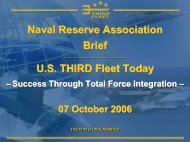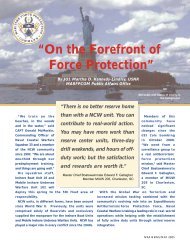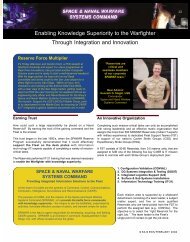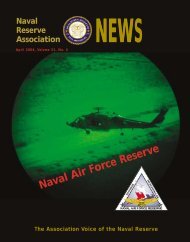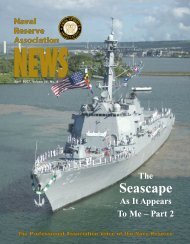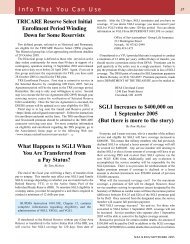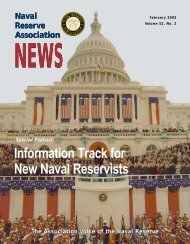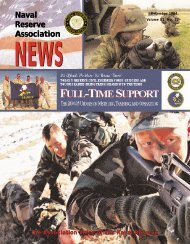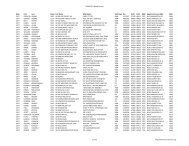Naval Reserve Association
Naval Reserve Association
Naval Reserve Association
You also want an ePaper? Increase the reach of your titles
YUMPU automatically turns print PDFs into web optimized ePapers that Google loves.
10Professional DevelopmentJPMEeeek!CAPT G. Mark Hardy III, USNNational VP for Professional DevelopmentHave you completed your JPME? Doyou know what these letters mean?Do you know why it’s important toyour career?Joint Professional Military Education(JPME) is a collection of joint learningobjectives (JLO) that comprise theeducational requirement for an officer toearn a Joint Specialty Officer (JSO)designation. JPME is usually divided intotwo phases. JPME Phase I consists of JLOsincluded in intermediate and senior levelservice college curricula. It emphasizes thefundamentals needed for a sound basis injoint operations and is taught from theComponent’s perspective. JPME Phase IIconsists of JLOs contained in the intermediateand senior level courses offered by the JointForces Staff College. Phase II emphasizesjoint perspectives, focusing on planning,operations, and procedures. Officers whoattend the National War College or theIndustrial College of the Armed Forcesreceive complete JPME credit. In addition,an officer must complete a joint tour to beeligible for designation as a JSO.Why JPME? Twenty years ago, assignmentto joint staffs was not considered to be careerenhancing. Services assigned officers whowere passed over or on their twilight toursto joint billets. There were obviousinefficiencies and problems, promptingCongress to address Pentagon reform.The Goldwater-Nichols act of 1986 madesignificant changes to the Department ofDefense. It removed the Chairman of theJoint Chiefs of Staff (CJCS) from the chainof command of operational forces, revisedJoint Staff duties, and established a JSOdesignation. As an incentive to attract officersto joint duty assignments, it stated “officerswho are serving in, or have served in, jointduty assignments are expected as a group tobe promoted at a rate not less than that for allofficers of the service in the same grade andcompetitive category,” and “officers may notbe selected for promotion to brigadier generalor rear admiral (lower half) unless they haveserved in a joint duty assignment.”Goldwater-Nichols created and mandatedJPME for active component (AC) officers.Additional legislation has expanded JPME.Title 10 USC, Chapter 38, Section 666directed a parallel program for reservecomponent (RC) officers. DoD INST1215.20 implements this program. TheFY2002 Defense Authorization Actauthorized funding for an Advanced JPME(AJPME) course.CAPT Tim Moon, one of the first RCofficers to complete AJPME, offers thefollowing:As a professional in the Navy, it is importantto study, to improve our skills, to expand ourknowledge, and to advance the professionwhile preparing ourselves for current andfuture assignments. Engaging in JPME willprovide the education and the tools to makeus relevant and advance the profession.There are a number of JPME Phase Iaccredited institutions. Because the programis joint, by definition officers can go to anyof the armed services for their education.The <strong>Naval</strong> War College (NWC) inNewport, RI, offers a Master of Arts inNational Security Studies and StrategicStudies to students who complete the tenmonthresident course or the Fleet Seminars.The correspondence course program has beenphased out and is replaced by Web-basedtraining. The two-week reserve seminarsoffered annually provide a sample of theinformation contained in the more rigorouscourses, but do not by themselves grantJPME credit. See COMNAVRESFORCOM051359Z AUG 05 to register for these twoweekcourses. For more information on NWCdistance learning, or to enroll in the Webbasedcourse, see .Other options for RC officers include theArmy War College in Carlisle, PA, , which offers a 24-month distance learning program with twosummer sessions. Additionally, the Air Command&StaffCollege is a popular option because itoffers the shortest non-resident seminar tocomplete JPME phase I – a mere 11 months.CAPT Stu Hinrichs, who led the reservecontingent that supported the Combined AirOperations Center (CAOC) in SouthwestAsia during Operation Iraqi Freedom, states:We are without question shaping anOperational Level of Warfare Community inour Navy. Within the RC, the Joint ForceAir Component Commander (JFACC), JointForce Maritime Component Commander(JFMCC), and Joint Task Force (JTF) units willheavily invest in the courses that alreadyexist and those that develop. We mustgrow a generation of Operational WarfareWarriors who understand Joint Planningand Execution System (JOPES), Course ofAction (COA) Development, time-phasedforce and deployment data (TPFDDs),and are well versed in Joint and Combinedprocesses. Further, they must develop thepersonal relationships with other service/nation counterparts to foster the synergyneeded when it must be done for real.Lastly, NAVADMIN 093/05 fundamentallychanges Navy <strong>Reserve</strong> officer career pathsand planning:Joint professional military education phaseone is now a requirement for unrestrictedline officers screening to unrestricted linecommander command (active duty andreserve commands) beginning with screeninggroups receiving their first look during thefiscal year 2009 command selection board(held February through December 2008).Selected reserve command billets, includingthose competed for via the APPLY process,are under review to determine which billetswill be subject to this requirement.Don’t neglect this important element ofcareer development. Those who do may findthemselves limited in career opportunities aswe progress further to a joint warfightingforce.See for amore complete discussion of professionalmilitary education (PME) opportunities.NRA NEWS/september 2005




